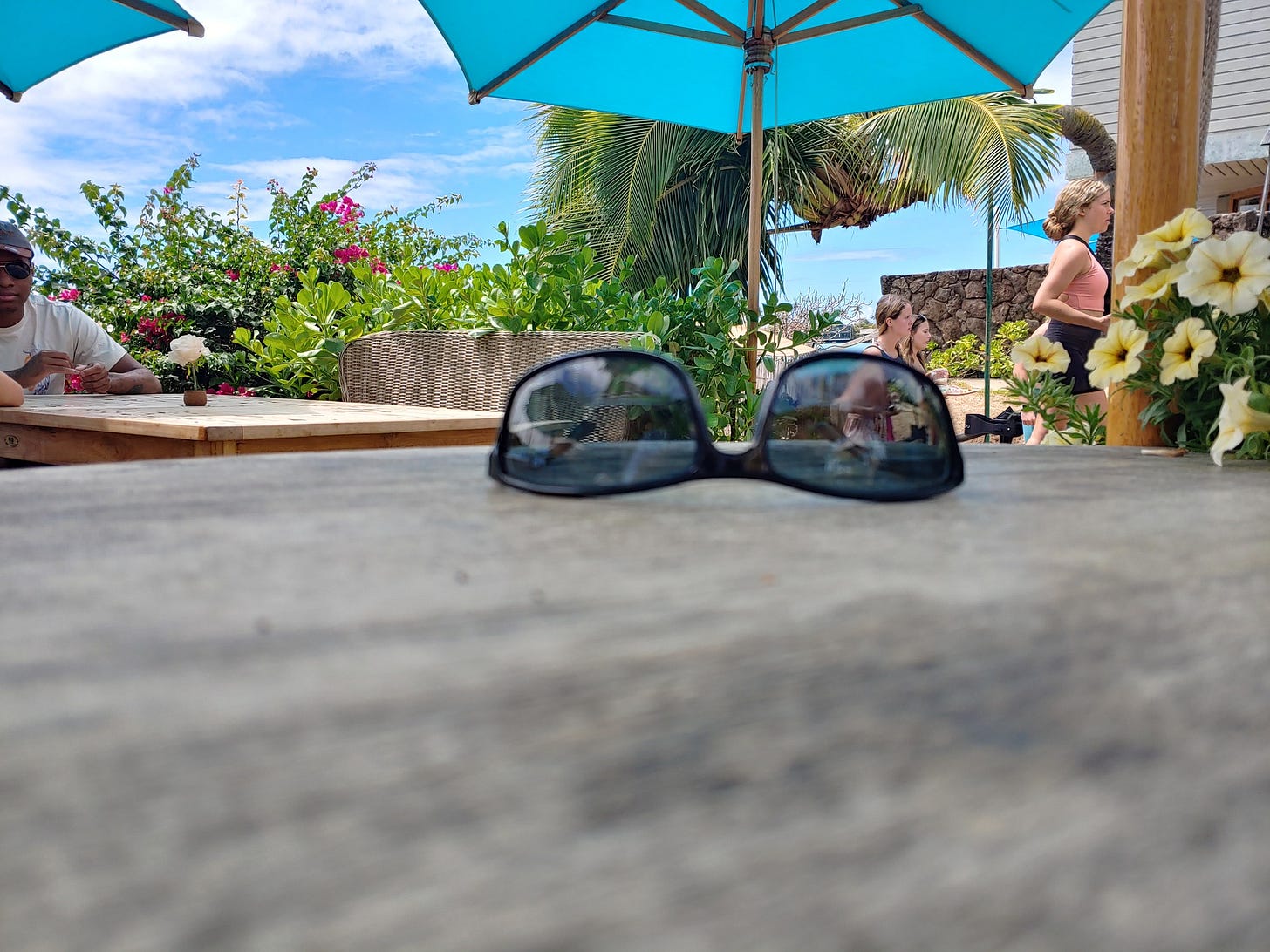Links are at the end.
I suppose I could be writing into the void at this point, but I think I’m actually back. Fingers feeling itchy for the keyboard, anyway.
I’ve been to the mainland U.S., where I was guilty of not melting into the arms of relative luxury, but I’ve made amends by appreciating some things since my return, including that almost nobody unsubscribed to this thing despite my unannounced self-exile, and coffee and company. My machine broke, I got a new one, and the only Mr. Coffee in my life now is my steadfast coffee companion at the waterside haven shown above (haven shown, companion implied).
I did some thinking during my most recent ketamine adventure, which is unusual and contrary to my intent. The problem was, I think, a failure to fully inhale the stuff on account of being congested; in any event a couple of minor epiphanies were visited upon me, which is good but not good enough to keep me from getting some loratadine to take before the next session in hope of opening the nasal passages to facilitate sweet oblivion.
Speaking of which, you may have seen that phenylephrine, commonly included in cold remedies as a decongestant, is not a decongestant when taken orally.1 This explains why the nighttime cold medication containing it didn’t decongest me during my recent encounter with the cold virus after a four-year break.
The Kansas City Star ran an editorial bemoaning the state of the U.S health care “system,” using as a vehicle the plight of a popular local DJ struggling with both cancer and the financial consequences of it.2
The writers note that per capita health care spending here is at a minimum 50% greater than the second highest spender’s (Switzerland, which coincidentally has one of the more similar systems to ours), and more often 100% or more than in other wealthy nations.
They are at pains, though, to convey that they “aren’t here to push for a single-payer system, government-managed insurance or any other specific program,” despite that those sorts of systems are responsible for the less insane cost of health care in other countries as developed as we (ostensibly) are.
Speaking of which, the pirate equity model of destroying health care organizations3 is stomping around in the global warming catastrophe, unsurprisingly favoring the catastrophe. The Guardian has a story on pirate equity’s increasing incursions into both the weather disaster recovery business and the greenhouse gas industries helping to create a host of climate-related disasters.4
As always, people at the bottom of every heap are the ones most damaged on both sides of the business.
Speaking of which, atmospheric scientist Scott Denning hopes that the press will quit describing, or wondering if they should describe the recent heat disasters as “the new normal.”5
A lot of commentary uses the framing of a “new normal,” as if our climate has undergone a step change to a new state. This is deeply misleading and downplays the danger. The unspoken implication of “new normal” is that the change is past and we can adjust to it as we did to the “old normal.”
Unfortunately, warming won’t stop this year or next. The changes will get worse until we stop putting more carbon dioxide and other greenhouse gases into the atmosphere than the planet can remove.
The excess carbon dioxide humans have put into the atmosphere raises the temperature – permanently, as far as human history is concerned. Carbon dioxide lingers in the atmosphere for a long time, so long that the carbon dioxide from a gallon of gasoline I burn today will still be warming the climate in thousands of years.
Debbie Downer Denning. He also notes that we know how to forestall an endless progression of hottest summers ever, for a relative pittance compared to the cost of not doing so.
Ah well.
The recent UAW elections are proving consequential, as the accommodationist old guard were largely voted out and the new leadership are unapologetically assertive, winning overwhelming worker support for striking all three major American automakers—Ford, GM, and, uh, Stellantis—simultaneously for the first time, with solid public support despite much of the press siding with the corporations.6
Ana Marie Cox lives in Texas and has thoughts—seeming to me about as sound as one could expect from the analysis of a nation’s psyche—about collective traumas on a continental scale.7
A study in meta-stupidity has Zuckerberg’s Threads blocking terms including ‘covid’ and ‘long covid’ from the search engine, so that you won’t be the subject of misinformation, which pretty much everybody on both sides of the misinformation divide agrees is Orwellian.8
That, comrades, is all I got for now. Enjoy some Zap Mama, and stay tuned.
Zap Mama, “A Ma Zone;9” Zap Mama, “Adventures in Afropea 1;10” Zap Mama, “Odyssée.11”





I’m so glad you’re back. You understand that if I go too long without a fix, I start having thoughts like, “Hmmm, maybe there’s something to this capitalism I keep hearing so much about.”
Welcome back. For some reason your system seems to be skeptical that I'm me. So it goes. At least I finally got back in.
One Quibble: Denning does concede that fixing things is "a big ask." Doesn't mean we shouldn't do it. Just means don't pretend it's going to be easy.